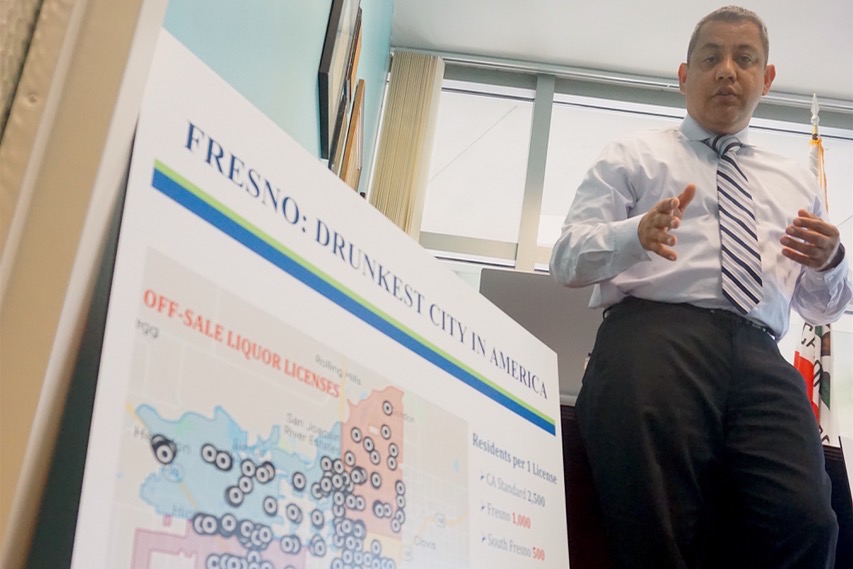
Miguel Arias’ first high-profile bill he sponsored along with Councilmembers Nelson Esparza and Luis Chavez would limit the number of new liquor licenses. Photo by Edward Smith
Written by
The Fresno City Council Wednesday voted 7-0 to initiate an ordinance capping the number of alcohol licenses allowed within city limits.
Sponsoring Councilmembers Miguel Arias, Nelson Esparza and Luis Chavez brought The Responsible Neighborhood Market Act before council chambers in a special session.
The council seemed in agreement about the change to the municipal code to restrict how Type 20 and Type 21 off-site licenses are issued.
The move comes in response to a designation by Men’s Health magazine in 2011 calling Fresno the drunkest city in America, based on the number of DUI deaths and alcohol-related diseases.
The Neighborhood Market Act would effectively reduce the ratio of liquor and beer licenses across the city. According to Council Vice President Arias, Fresno has the highest concentration of alcohol vendors in the state.
California averages 2,500 residents per license, but in Fresno that ratio is around 1,000. South of Shaw Avenue, that number gets as high as 500 residents per vendor.
The zoning ordinance change would require new license applicants whose business space is below 10,000 square feet to not only purchase a license of their own, but also buy an existing one and retire it. Businesses between 10,000 and 30,000 square feet would buy one and retire two others. Those over 30,000 square feet would have to buy one and retire three old licenses.
Full-service grocery stores would be exempted.
The bill also requires that those licenses come from saturated areas.
“We’re taking the opportunity of any development that wants to sell alcohol in our city to actually reduce the saturation of licenses,” Arias said.
Part of the bill also addresses liquor advertisements at convenience stores.
The proposed ordinance would reduce the amount of signage to 5% from 15%. Councilmember Garry Bredefeld raised concerns about code enforcement. The Fresno City Attorney’s office did an investigation and found 930 violations in 204 businesses within a week-and-a-half period.
When called to the dais with questions about the nature of code enforcement, Jennifer Clark, director of the development department, noted it was a “reactive process.” They only respond to complaints rather than proactively seeking out violations. Addressing a full docket of complaints brought about by the bill would require additional revenue for staffing.
Instead of demonstrating a need for change, Bredefeld said, quoting from the ordinance proposal, it represents a need for code enforcement.
Sponsoring Councilmember Chavez referred to this step as “the beginning of the conversation.” Following an environmental review, it will head to implementation committees of each council, then to public hearings by both the Airport Commission and the Planning Commission. The Fresno City Council will have two readings of the bill and two votes. If approved, it would be implemented within 30 days.
“Problem identification, that’s easy,” said Council President Paul Caprioglio. “Problem solutions, that’s what we need to focus on.”








